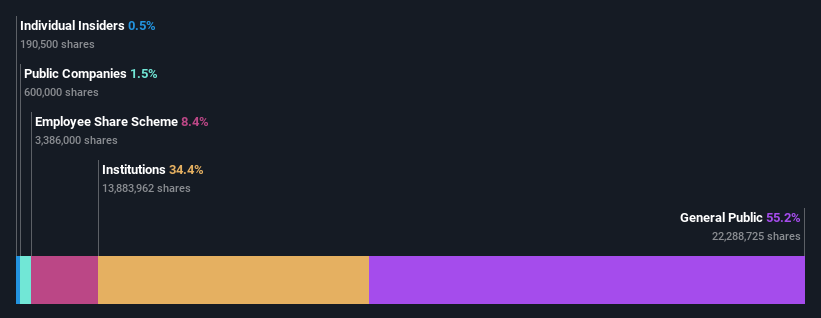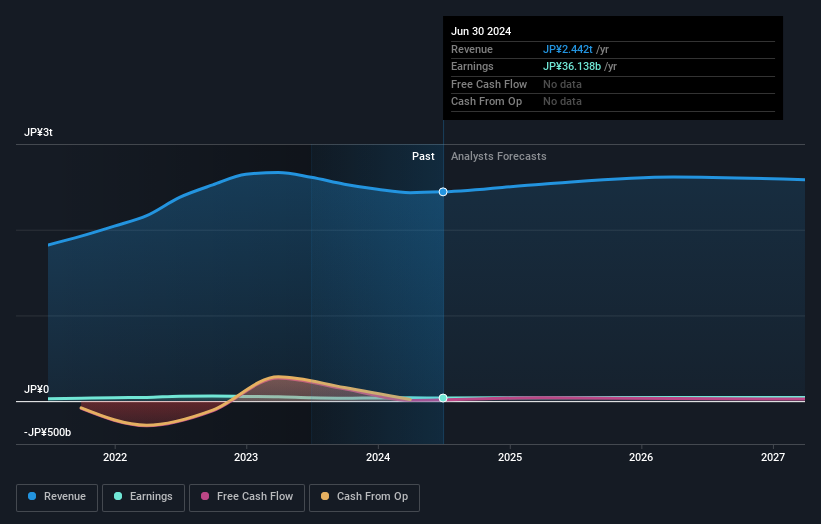- Japan
- /
- Trade Distributors
- /
- TSE:8078
Hanwa Co., Ltd.'s (TSE:8078) 3.8% loss last week hit both individual investors who own 55% as well as institutions

Key Insights
- The considerable ownership by individual investors in Hanwa indicates that they collectively have a greater say in management and business strategy
- 43% of the business is held by the top 25 shareholders
- Institutional ownership in Hanwa is 34%
To get a sense of who is truly in control of Hanwa Co., Ltd. (TSE:8078), it is important to understand the ownership structure of the business. And the group that holds the biggest piece of the pie are individual investors with 55% ownership. That is, the group stands to benefit the most if the stock rises (or lose the most if there is a downturn).
Following a 3.8% decrease in the stock price last week, individual investors suffered the most losses, but institutions who own 34% stock also took a hit.
Let's delve deeper into each type of owner of Hanwa, beginning with the chart below.
Check out our latest analysis for Hanwa

What Does The Institutional Ownership Tell Us About Hanwa?
Institutions typically measure themselves against a benchmark when reporting to their own investors, so they often become more enthusiastic about a stock once it's included in a major index. We would expect most companies to have some institutions on the register, especially if they are growing.
Hanwa already has institutions on the share registry. Indeed, they own a respectable stake in the company. This suggests some credibility amongst professional investors. But we can't rely on that fact alone since institutions make bad investments sometimes, just like everyone does. If multiple institutions change their view on a stock at the same time, you could see the share price drop fast. It's therefore worth looking at Hanwa's earnings history below. Of course, the future is what really matters.

We note that hedge funds don't have a meaningful investment in Hanwa. Hanwa Clients' Stock Investment Association is currently the largest shareholder, with 5.7% of shares outstanding. In comparison, the second and third largest shareholders hold about 4.0% and 3.9% of the stock.
A deeper look at our ownership data shows that the top 25 shareholders collectively hold less than half of the register, suggesting a large group of small holders where no single shareholder has a majority.
While it makes sense to study institutional ownership data for a company, it also makes sense to study analyst sentiments to know which way the wind is blowing. There are plenty of analysts covering the stock, so it might be worth seeing what they are forecasting, too.
Insider Ownership Of Hanwa
While the precise definition of an insider can be subjective, almost everyone considers board members to be insiders. Management ultimately answers to the board. However, it is not uncommon for managers to be executive board members, especially if they are a founder or the CEO.
I generally consider insider ownership to be a good thing. However, on some occasions it makes it more difficult for other shareholders to hold the board accountable for decisions.
Our data suggests that insiders own under 1% of Hanwa Co., Ltd. in their own names. It is a pretty big company, so it would be possible for board members to own a meaningful interest in the company, without owning much of a proportional interest. In this case, they own around JP¥942m worth of shares (at current prices). Arguably, recent buying and selling is just as important to consider. You can click here to see if insiders have been buying or selling.
General Public Ownership
The general public -- including retail investors -- own 55% of Hanwa. This size of ownership gives investors from the general public some collective power. They can and probably do influence decisions on executive compensation, dividend policies and proposed business acquisitions.
Next Steps:
It's always worth thinking about the different groups who own shares in a company. But to understand Hanwa better, we need to consider many other factors. Case in point: We've spotted 2 warning signs for Hanwa you should be aware of, and 1 of them makes us a bit uncomfortable.
If you would prefer discover what analysts are predicting in terms of future growth, do not miss this free report on analyst forecasts.
NB: Figures in this article are calculated using data from the last twelve months, which refer to the 12-month period ending on the last date of the month the financial statement is dated. This may not be consistent with full year annual report figures.
Valuation is complex, but we're here to simplify it.
Discover if Hanwa might be undervalued or overvalued with our detailed analysis, featuring fair value estimates, potential risks, dividends, insider trades, and its financial condition.
Access Free AnalysisHave feedback on this article? Concerned about the content? Get in touch with us directly. Alternatively, email editorial-team (at) simplywallst.com.
This article by Simply Wall St is general in nature. We provide commentary based on historical data and analyst forecasts only using an unbiased methodology and our articles are not intended to be financial advice. It does not constitute a recommendation to buy or sell any stock, and does not take account of your objectives, or your financial situation. We aim to bring you long-term focused analysis driven by fundamental data. Note that our analysis may not factor in the latest price-sensitive company announcements or qualitative material. Simply Wall St has no position in any stocks mentioned.
About TSE:8078
Hanwa
Trades in steel, metals and alloys, nonferrous metals, food products, petroleum and chemicals, lumber, machinery, and other products in Japan and internationally.
Established dividend payer and good value.
Market Insights
Community Narratives




